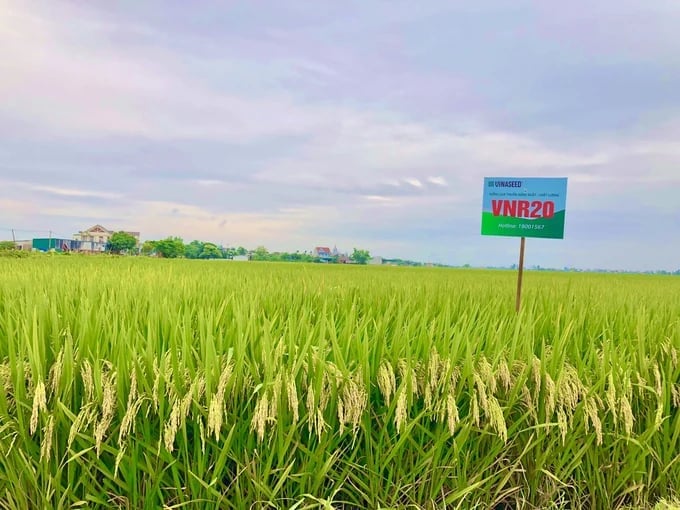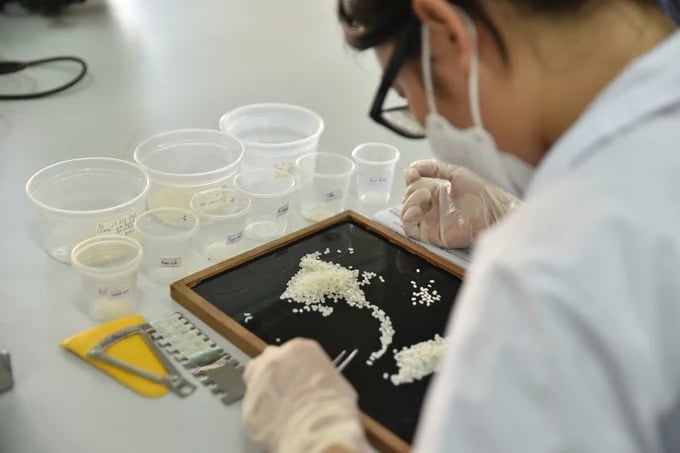May 24, 2025 | 16:23 GMT +7
May 24, 2025 | 16:23 GMT +7
Hotline: 0913.378.918
May 24, 2025 | 16:23 GMT +7
Hotline: 0913.378.918
Vietnam Seed Group Joint Stock Company (Vinaseed) is a leading science and technology (S&T) enterprise with the largest scale and market share in the Vietnamese seed industry. Annually, Vinaseed supplies up to 100,000 tons of quality rice seeds for production nationwide.

Vinaseed Chairwoman: "It is necessary to establish a new mechanism for research and technology transfer." Photo: NSC.
In Vietnam, Vinaseed is the first unit to participate in creating the S&T market. Since 2006, Vinaseed has received the transfer of the Khang Dan mutant rice variety and DB6 variety from the Central Plant Variety Testing Center and the Institute of Agricultural Genetics. Since then, the company has acquired the rights to six rice and corn varieties and received business rights transfers for three rice varieties from institutes and universities under the Ministry of Agriculture and Rural Development (MARD).
The company is in charge of two rice research projects for the Ministry of Science and Technology and the salt-tolerant hybrid rice project (KC06-1 and KC06-2). These initiatives are the results of public-private partnerships in scientific and technological research, bringing significant efficiency and contributing to improving productivity, quality, and development of the Vietnamese rice production industry. The mentioned crop varieties are currently commercialized in all regions of the country.
“Vinaseed considers cooperation with the public sector in applying and transferring advances of S&T as one of its important strengths, the development path, and achieving the current scale and market share,” emphasized Ms. Tran Kim Lien, Chairwoman of Vinaseed Board of Directors.

Vinaseed is a leading enterprise that applies science and technology to agricultural production. Photo: NSC.
However, according to Ms. Lien, public-private partnerships in S&T in agriculture, particularly in plant varieties, remain limited in quantity and quality and face many challenges. A mechanism needs to promote and address these issues. Overcoming and resolving difficulties in public-private partnership is crucial for scientific and technological research activities in the agricultural sector.
Ms. Lien believes that public-private partnerships are crucial in the current period to maximize social resources and connect research with the market. This would promote the transfer of modern technology into production, thereby restructuring the agricultural sector towards large-scale operations and adapting to global climate change.
Additionally, it would meet the market's diverse and constantly changing needs, improving the competitiveness of Vietnam's agricultural sector.
To promote public-private partnership in the field of research, application, and transfer of S&T advances, particularly in the context of limited and unfocused research budgets, Vinaseed proposes amending Decree 70/2018/ND-CP. This amendment should align with the newly revised provisions of the Law on Intellectual Property and create a legal framework for cooperation in research, application, and transfer of scientific and technological advances.
The Chairwoman of Vinaseed's Board of Directors emphasized that the amended laws will facilitate immediate tasks and fundamental research, creating a source of materials with desirable characteristics to support the breeding process.
Vietnam has the Law on Science and Technology, the Law on Science and Technology Transfer, the amended Law on Intellectual Property 2022 No. 07/2022/QH15, and the Law on Management and Use of Public Assets 2017. The MARD has also issued a circular guiding the delegation of management and use of scientific and technological research results.
“However, it is currently very difficult to implement transfer cooperation due to state regulations in Decree 70/2018/ND-CP and Circular 63/2018/TT-BTC, which guide the implementation of Decree 70, as well as Circular 02/2020/BKHCN, which guides the implementation of Clause 1 - Article 44 of Decree 70,” Ms. Lien explained.
Therefore, a mechanism needs to be established to select research projects through orders, link production to the market, and allow qualified enterprises to participate transparently. These enterprises should also be allowed to participate in project funding, with clearly defined rights and obligations for all parties to mobilize resources for research.

Public-private partnerships will promote the transfer of modern technology into production, connecting research with the market. Photo: VAN.
The Ministry of Science and Technology and the MARD must develop pilot public-private partnership projects according to a complete service chain to connect research facilities with application transfer, production, business, and brand building, serving sustainable development.
In the immediate future, this needs to be implemented in the 1 million-hectare low-carbon and high-quality rice program in the Mekong Delta, which aims to adapt to climate change and promote green, sustainable production. There needs to be a clear mechanism for engagement and sharing of benefits among the participating parties.
Additionally, it is necessary to establish a mechanism for research institutes to expand international cooperation, exploit advanced genetic resources, and expand reproduction. This will help nurture resources for public research institutions once they generate revenue. Currently, this mechanism has not effectively motivated research institutions and scientists as much as businesses.
On July 10, the MARD organizes a forum to connect agricultural science and technology products with businesses, cooperatives, and the public. Minister of Agriculture and Rural Development Le Minh Hoan and Deputy Minister Phung Duc Tien will chair the forum.
Attending the forum are leaders of units, research institutes, schools under the MARD, enterprises, cooperatives, international organizations, and other stakeholders related to the agricultural sector.
The forum is organized in a question-and-answer format, directly addressing the questions of interested delegates. It features reports introducing the MARD's policies in encouraging research and innovation in science and technology and the results achieved. Additionally, it introduces typical examples of successful transfers of science and technology products into production.
Within the forum, from July 9-10, at the MARD (No. 2 Ngoc Ha, Ba Dinh, Hanoi), a space is organized to display and introduce outstanding products, technologies, and research results from institutes, schools, and enterprises. The exhibition features eight display spaces covering fields such as crop cultivation and plant protection, animal husbandry and veterinary medicine, forestry, aquaculture, irrigation and natural disaster prevention, electromechanics, and post-harvest technology.
Translated by Quynh Chi

(VAN) The People's Committee of Tra Vinh province has approved an adjustment to the investment policy for the Green Hydrogen Plant project, increasing its area to approximately 52.76 hectares.
![Reducing emissions from rice fields: [2] Farmers’ commitment to the soil](https://t.ex-cdn.com/nongnghiepmoitruong.vn/608w/files/news/2025/05/05/dsc08881jpg-nongnghiep-140632.jpg)
(VAN) Clean rice cultivation model in Thuong Tan commune, Bac Tan Uyen district, is assisting local residents in achieving sustainable agriculture by substantially reducing costs, increasing productivity, and protecting the environment.

(VAN) At the conference to disseminate Resolution No. 68, AgriS introduced its digital agricultural ecosystem and reaffirmed its commitment to accompanying the Government in promoting private sector development and sustainable agriculture.

(VAN) 'Blue Ocean - Blue Foods' initiative is designed to restore marine ecosystems and establish sustainable livelihoods for local communities by cultivating a minimum of 1,000 hectares of cottonii seaweed in the first three years.
/2025/05/21/4642-3-112707_603.jpg)
(VAN) The V-SCOPE project has made direct contributions to three out of six pillars of the Comprehensive Strategic Partnership between Vietnam and Australia.

(VAN) Facing the threat of rabies spreading to the community, Gia Lai province urgently carries out measures to vaccinate dogs and cats on a large scale.

(VAN) Disease-free livestock farming not only protects livestock herds but also stabilizes production and livelihoods for many farmers in Tuyen Quang.